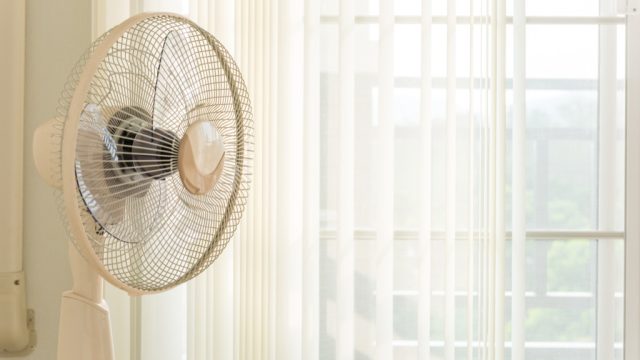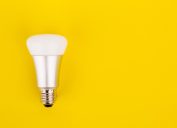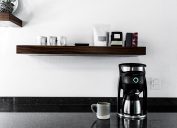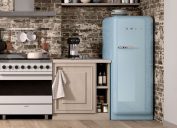Here's Why You Should Never Use an Electric Fan in Summer
Don't make this crucial error in your quest to get cool.

Everyone knows that an air-conditioned home is one of the ultimate respites from sweltering summer heat. However, for those unlucky souls among us who live without the benefit of central air, staying cool when the mercury rises is a much more difficult feat.
Of course, most people without the luxury of A/C immediately turn to an electric fan for relief—but believe it or not, this does more harm than good in the fight against the sweat-inducing summer sun.
But how's that possible? Well, as cruel as it may seem, the very fan you're using to cool off could actually be increasing the temperature in your home, depending on how you're using it.
As is the case with practically any appliance with a motor, fans—due to a combination of their electric current and their moving parts—heat up while they're in use and indirectly warm the area around them as a result. "Fans can make your home even warmer during summer, if you don't use [them] the right way," says Matthias Alleckna, an energy analyst at EnergyRates.ca.
While the current of air your fan creates and blows in your direction might give off the appearance of cooling you down, what you're actually feeling is the evaporation of sweat on your skin. Though this may offer some comfort in moderate heat, it won't do much when temperatures soar. Even worse, the temperature increase they can cause may actually prove to be dangerous.
"Fans may provide comfort, but they will not prevent heat-related illness when the temperature is in the high 90s," says Michael McGeehin, PhD, MSPH, director of CDC's Division of Environmental Hazards and Health Effects.
This isn't the only way your fan use could be contributing to the sweat-lodge-like conditions in your home. Whereas traditional fans only raise the temperature in your home ever so slightly, if you're not strategic about the use of your ceiling fan, you can cause your home to heat up significantly.
"Ceiling fans have an ideal direction for summer and another one for winter, which can make your home colder or warmer, depending on your preferences," explains Alleckna. "On hot days, ceiling fans should run in the counterclockwise direction. The summer mode will make your ceiling fan suck the warm air up and push the cold air down. If you use it in the clockwise direction during summer, the chances are high that you will feel the air get even hotter inside your home."
If you have no option but to use a box fan to stay cool, being strategic about its placement can make all the difference. If you want to bring in cooler air and keep the warm air out, Alleckna recommends placing your fan next to a window or door for maximum benefit. If you want a more effective solution for staying cool, invest in light-blocking curtains, turn off any appliances that aren't in use, and sip water throughout the day to keep from overheating. And for more ways to beat the heat, check out these 20 Surprising Things That Can Keep You Cooler All Summer.
To discover more amazing secrets about living your best life, click here to follow us on Instagram!





















